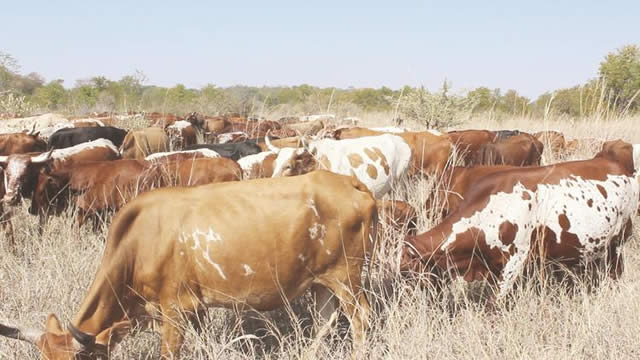The fittest will survive the crisis

Stephen Mpofu
“Whether the weather be good, whether the weather be bad we shall weather the weather.”
Nothing could have been — and can still be — a more ideal 2016 typical new year resolution than a resolute commitment by Zimbabweans to survive as a united people and usher the motherland into a bold new future socially, politically and economically.
Unfortunately, however, the same cannot be said about the survival of livestock in this country as a national herd in face of the drought now fast developing into a crisis in many parts of the country.
Yes, food shortages in many drought-stricken parts of Zimbabwe are most likely to grow worse in the absence of any meaningful rainfall even as late as now. Crops planted at the onset of the rainy season, about three months ago, are reportedly wilting, or have dried up altogether as have pastures that at this time of year should have been lush-green with fluffy grass on which cattle grazed with their tails raised, are now dry and wind-swept in some areas.
Unicef has estimated that about 500,000 Zimbabweans face starvation this year as a result of crop failure in drought ravaged southern parts of the country which include Matabeleland South, the Midlands, Masvingo and Manicaland to the east.
But unlike in the case of livestock, the government in 2015 imported maize from Zambia which was distributed to those badly in need of the staple diet. More food will have to be imported to feed half a million mouths or more until the next cropping season, not withstanding challenges the government is experiencing regarding the availability of adequate cash in an economy that can be said without exaggeration to be weak-kneed and just limping on, thanks to economic sanctions imposed by the US and Europe to protest land reform which has seen thousands upon thousands of Zimbabweans accessing rich land previously stolen from them by white settlers in colonial Rhodesia and into the early years of Zimbabwean independence.
It is possible that some foreign countries, particularly those in the West, will express a desire to provide food aid but with huge chunks of political or economic flesh or both being hacked off from recipients as a conditionality for the aid.
Unfortunately, to date, not much has been said in both government and private sector circles about providing much-needed relief for the national herd now facing certain decimation by a drought the end of which no one has foreseen so far.
The situation verges on the tragic with the major dealer in the beef industry, the Cold Storage Commission, remaining virtually tight lipped on what measures it intends to take to rescue cattle that risk dying from lack of feed as pastures in many parts of the country are now parched with virtually no succulent blade of grass left for scrawny cattle or goats or donkeys to pick out as they wonder hither and thither on grazing lands now resembling deserts in the making for most of those pastures.
In Matabeleland South province, a prime cattle-rearing area, some villagers are reportedly cutting tree branches to feed tree leaves to their fallen and weak beasts for which survival becomes almost a miracle.
All that people have heard so far have been calls by some government officials on villagers to sell their livestock early enough as retaining them could result in the animals dying with the drought continuing.
One would have expected, however, that the government would have put measures in place by arranging with farmers in areas not seriously affected by the drought to have cattle from drought-stricken areas moved to the farms where pastures are still green until such a time as the drought comes to an end.
The villagers could be made to pay the farm owner in kind or to sell one or two of their beasts to pay for the temporary upkeep of the cattle.
Probably more ideally, the CSC could bring to its farms in provinces not affected by the drought cattle from danger-zone districts until the drought is over, with some money or beast being paid by cattle owners for the service rendered by the commission.
Felix Moyo, Director of Communication and Marketing at the National University of Science and Technology in Bulawayo spoke a few days ago about the importance of empowering villagers with knowledge about the security of the livestock upon which some owners have an emotional attachment as their immediate, visible wealth.
It is important, Moyo said, that villagers kept the right number of oxen as draught power and a few cows for milk rather than boasting a large herd of beasts that they cannot manage in crisis times such as during crushing droughts, for instance.
In colonial Rhodesia white rulers compelled villagers to keep at least two oxen or at most four for use in ploughing and other domestic chores, such as drawing scotch carts carrying manure from villages to the fields, as well as two or three cows to supply milk.
Africans regarded the decision for them to keep fewer cattle than they desired as a form of “racist oppression” by the successive white regimes.
That could well have been true, but there was still some virtue in that decision which was informed by a realisation that fewer animals stood a better chance of survival by not overgrazing on smaller pieces of land to which blacks were restricted and with homesteads being set up in “lines” for ease of administrative control by white native commissioners.
This pen fears that if the government does not weigh in heavily with adequate measures for the survival of Zimbabwe’s national herd, which stands at just over five million animals, at the end of the drought owners will be faced with the painful, stark reality of counting not their animals feeding on the pastures but rather skeletons of their once-proud stock littering the veld and with vultures belching contentedly as they gouge out bits of flesh embedded in the joints of the fallen beasts.
What a triumph over the drought it would be were Zimbabwe’s national herd somehow to be heard saying at the end of it all; “whether the weather was good, whether the weather was bad we weathered the weather.”








Comments